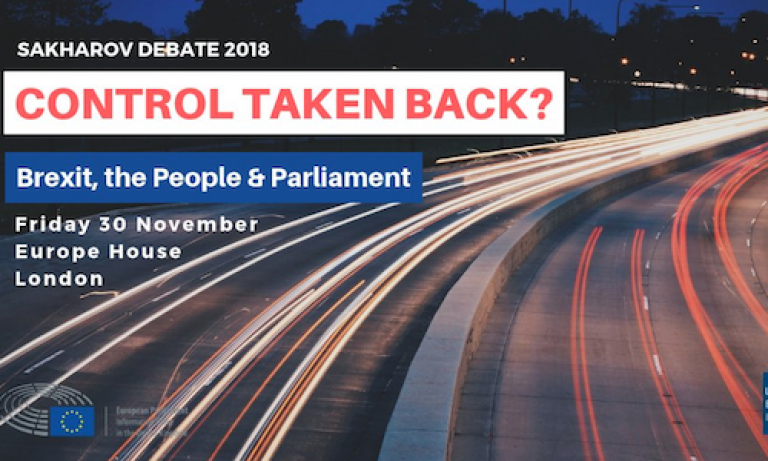Control Taken Back? Brexit, the people and parliament (Sakharov Debate 2018 Highlights)
7 December 2018

Sakharov Debate 2018 Event Highlights, 30.11.2018
Event co-organised by the European Parliament Office in the UK and the UCL European Institute
Speakers
- James Carver MEP - Independent Member of the European Parliament for the West Midlands
- Matthew Goodwin - Professor of Politics and International Relations, University of Kent
- Ronan McCrea - Professor of Constitutional and European Law, UCL Laws
- Gina Miller - Businesswoman and political campaigner
- Martine Croxall (moderator) - BBC News Presenter
This film is produced by Giulio Gobbetti.
Description
The demand to “take back control” played a central role in the Leave campaign. The UK was to regain power not only over its borders, but also over its way of life and its laws. UK citizens would be re-empowered through their democratically elected national, for some regional, and local representatives, whom they could hold to account at the ballot box. Parliament was to become sovereign again, able to change legislation it deemed no longer appropriate. Laws and rules applicable in the country would be made here once again, freeing the country from the shackles of the European Court of Justice and the supremacy of EU over UK law.
As such, Brexit promised to enhance both citizens’ political rights and parliamentary sovereignty. The former, which are the original and main part of international human rights, encompass rights of participation, including the rights to vote and to petition, as well as to seek legal remedy or redress and to procedural fairness. The latter, as a principle of the UK constitution, makes Parliament the supreme legal authority in the UK, which can create or end any law. Generally, the courts cannot overrule its legislation and no Parliament can pass laws that its successors cannot change.
Four months before the UK is scheduled to leave the EU, this panel debate takes stock of both.
How have our political rights and parliamentary sovereignty fared in the process of negotiating and legislating for Brexit? How has this process affected the balance between the government/ civil servants and the legislature? How far was Parliament able to check, influence, and hold the executive accountable? How did checks and balances between government, Parliament and the Courts play out in the negotiations, and in transposing the whole body of EU law onto the UK statute book?
What is the situation likely to be as a result of Brexit? Will Parliament stand empowered? Will we as citizens be able to exercise our political rights more meaningfully? How much of our law will be made domestically, and how far will UK laws, standards and regulations, still have to mirror EU ones? Will this change down the line and, if so, when and how? What will it mean for UK citizens to lose their EU citizenship and the political rights that come with it?
What will Brexit do to the political rights of particular groups, including British expats settled in the EU and EU citizens living in the UK?
 Close
Close

